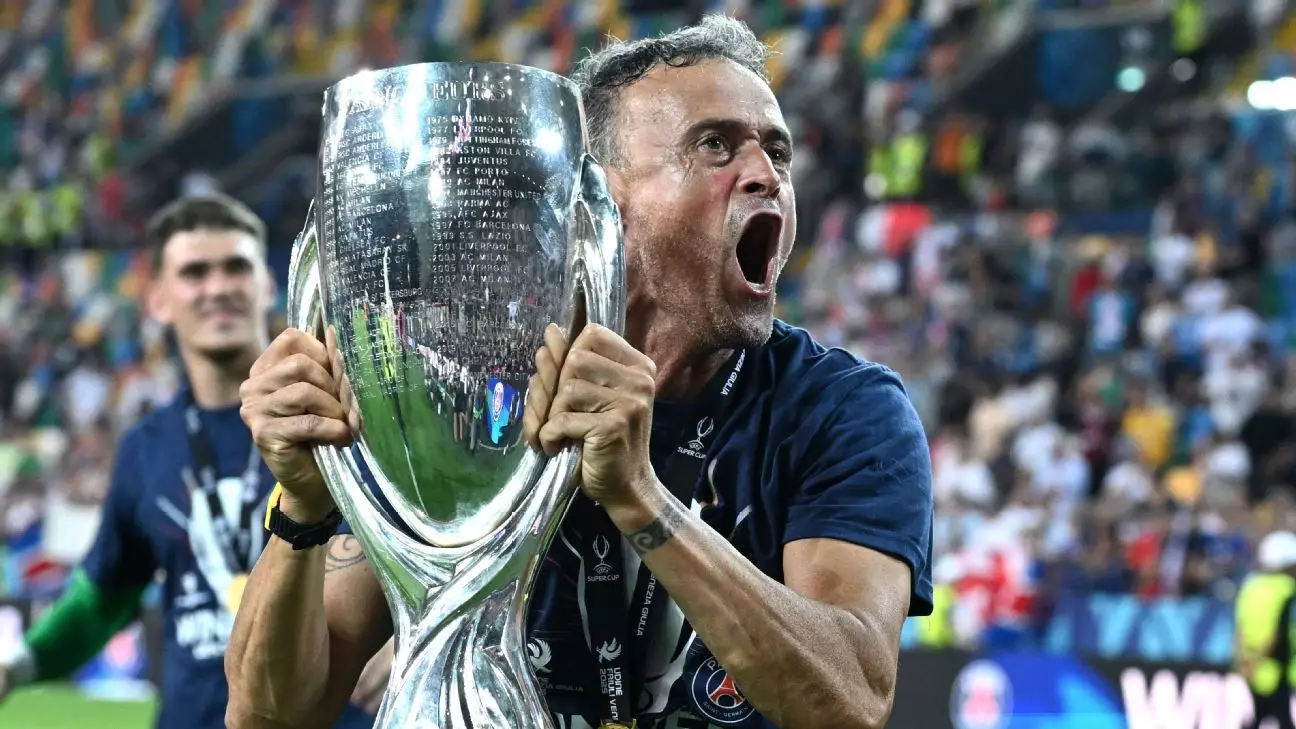In the high-stakes world of European football, the UEFA Super Cup serves as a battleground where prestige meets prowess. Paris Saint-Germain’s recent fixture against Tottenham Hotspur was more than just a game; it was a testament to resilience, determination, and the complex nature of sporting narratives. Despite being the reigning champions of the Champions League and Europa League, PSG’s unexpected late rally raises questions about the team’s confidence, preparation, and overall approach. Coach Luis Enrique’s candid admission that his squad “didn’t deserve” to win reflects a rare moment of honesty that lays bare the stark reality: success in football isn’t just about talent but also about mental toughness and tactical discipline.
Beginning the match with a significant disadvantage, PSG found themselves trailing 2-0 in the 85th minute, a lead many would consider insurmountable. Yet, football’s inherent unpredictability surfaced as PSG scored two late goals, forcing the game into a penalty shootout—a format that often amplifies luck as much as skill. The victory was tinged with controversy, not just because of the scoreline but because it highlighted disparities between the two teams’ physical readiness. PSG’s recent congested schedule, stemming from their deep run in the Club World Cup, contrasted sharply with Tottenham’s six-week training period, revealing a fundamental weakness in their fitness and rhythm.
The idea that fitness disparities can sway outcomes so dramatically serves as an important reflection on modern football’s demanding schedules. It’s not enough for a squad to have technical skill; endurance and match sharpness are equally vital, especially when competing at the highest levels. PSG’s fortunate escape underscores the importance of comprehensive preparation and mental resilience—elements that make the difference between winning and simply being fortunate.
Debut Disarray and Goalkeeper Turmoil
A defining narrative emerging from this match was the debut of Lucas Chevalier, PSG’s latest goalkeeper acquisition. Stepping into the limelight unexpectedly, Chevalier’s performance was a microcosm of both promise and vulnerability. His initial mistake—parrying Joao Palhinha’s shot onto the crossbar—set the tone for a challenging evening. His subsequent errors, including failing to save a header from Cristian Romero, revealed the immense pressure new players face when thrust into high-profile fixtures.
Such moments are often remembered more for their emotional impact than their context, yet Chevalier’s bravery in saving a penalty during the shootout cannot be overlooked. His actions exemplify the mental strength required at this level, especially considering that fellow legend Gianluigi Donnarumma, often regarded as one of the world’s best, was absent from the squad due to his departure from PSG. This situation raises broader questions about squad stability and the pressure on young talent to perform alongside or in the absence of more experienced figures.
Interestingly, this debut performance also sparks debate about talent development versus immediate results. Chevalier’s errors could be attributed to nervousness, lack of experience, or simply the chaotic nature of football. Regardless, his resilience in the shootout points to a player willing to grow through adversity—a vital trait for future success. Yet, underlying all this is a pressing concern: what does PSG’s goalkeeper situation say about their long-term ambitions and strategic planning? Relying on a newcomer in such a crucial match is inherently risky, and it underscores the chaotic turbulence within the club’s roster management.
Football as a Reflection of Personal and Club Identity
The emotional rollercoaster experienced in this match extends beyond tactics and statistics; it mirrors the broader identity struggles of PSG as a club. A team built on star power and lofty ambitions, PSG often finds itself in a paradox—struggling with consistency despite possessing some of the world’s best talents. The late rally demonstrates an admirable grit, highlighting a team that refuses to accept defeat prematurely. Yet, it also exposes cracks in their foundational stability, particularly in areas like fitness, tactical cohesion, and strategic planning.
Luis Enrique’s comments about the team’s fitness level and their surprise victory reflect a deeper truth: the psychological burden of expectation can undermine even the most talented squads. The pressure to deliver in the coliseum of European football can distort perceptions of worth and effort. For PSG, this match becomes a mirror, revealing both their vulnerabilities and their capacity for extraordinary resilience. Their ability to come back from the brink suggests a team with heart, but it also indicates an urgent need to address systemic issues that could threaten their future dominance.
In the broader landscape of football, this game exemplifies how moments of chaos and resilience shape narratives—stories that can inspire or haunt clubs for seasons to come. While PSG’s late heroics breathe new life into their campaign, they also serve as a stark reminder that sustained success requires more than fleeting sparks of brilliance; it demands consistency, strategic foresight, and mental fortitude at every level of the organization.


Leave a Reply